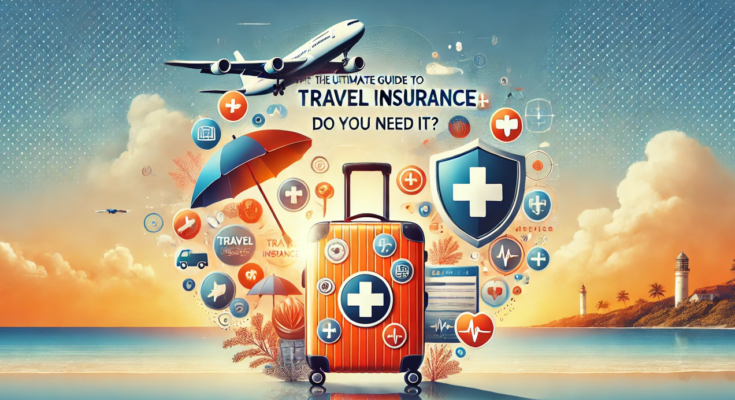Understanding Travel Insurance: A Complete Guide, Travel insurance is one of those things that many travelers overlook until it’s too late. While it might seem like an unnecessary expense at first, having travel insurance can provide invaluable peace of mind in the event of an unexpected emergency or problem. Whether you’re traveling abroad for business or leisure, travel insurance can help protect you from the unforeseen, offering coverage for issues like trip cancellations, medical emergencies, lost luggage, and more.
In this comprehensive guide, we will explore the importance of travel insurance, what types of coverage are available, and how to choose the right plan for your needs. Understanding Travel Insurance: A Complete Guide.
What is Travel Insurance?
Travel insurance is a policy that covers the financial risks and losses associated with traveling. It typically offers protection against unforeseen events that could disrupt or cancel a trip, such as illness, accidents, flight delays, or natural disasters. Some plans also cover emergency medical expenses, lost luggage, trip cancellations, and other unexpected travel issues. Understanding Travel Insurance: A Complete Guide.
Travel insurance is a safeguard that can help ensure you’re not financially burdened if something goes wrong during your trip. Depending on the plan you choose, travel insurance can cover you for a wide range of incidents, ranging from minor disruptions like a delayed flight to major emergencies such as medical evacuations or trip cancellations due to unforeseen circumstances.
Why Do You Need Travel Insurance?
- Unpredictability of Travel
Travel, whether domestic or international, is inherently unpredictable. Flights can be delayed or canceled, luggage can be lost, and emergencies can arise. Travel insurance offers you protection against these uncertainties, helping to mitigate the financial and emotional toll of such disruptions. - Medical Emergencies
Health problems can occur at any time, and if you fall ill or get injured while traveling, the cost of medical treatment abroad can be astronomical. Depending on where you are, medical care may not be covered by your regular health insurance. Travel insurance often includes coverage for emergency medical care, evacuation, and repatriation. - Trip Cancellation or Interruption
Life doesn’t always go according to plan, and unexpected events, such as the death of a family member, illness, or work-related emergencies, can force you to cancel or cut your trip short. Travel insurance provides coverage for non-refundable trip costs like airfare, hotel bookings, and tours if your trip is canceled or interrupted. - Lost or Delayed Luggage
Losing your luggage, or even experiencing a delay, can be more than just inconvenient. It may result in additional expenses, especially if you have to purchase replacement clothing or toiletries. Travel insurance often provides compensation for lost, stolen, or damaged luggage and other personal belongings. - Natural Disasters and Political Unrest
Traveling to regions affected by natural disasters or political instability can put you at risk. Travel insurance typically covers trip cancellations or interruptions if these events cause disruption. Additionally, some policies may cover evacuation from areas impacted by disasters. - Peace of Mind
Above all, travel insurance provides peace of mind. Knowing you are covered in the event of an emergency allows you to enjoy your travels with fewer worries.
Types of Travel Insurance Coverage
There are several types of travel insurance coverage, each offering different levels of protection. The main types of coverage are:
- Trip Cancellation and Interruption Insurance
This is one of the most common types of travel insurance. It covers you if you need to cancel or interrupt your trip due to unforeseen circumstances. This can include medical emergencies, family emergencies, or issues such as weather events or natural disasters. Coverage typically includes non-refundable expenses like airline tickets, hotel stays, and tour packages. - Emergency Medical Insurance
If you become ill or injured while traveling, emergency medical insurance can cover the costs of medical treatment. This is particularly important for international travelers, as many foreign medical facilities may not accept your home country’s health insurance. Emergency medical insurance often includes coverage for emergency evacuation if you need to be transported to a facility with better care. - Baggage Loss and Delay Insurance
This coverage reimburses you for lost, damaged, or delayed luggage. If your luggage is lost, the insurance can help you replace essential items, while if your luggage is delayed, it can help you purchase necessary clothing and toiletries until your luggage arrives. - Travel Delay Insurance
If your trip is delayed due to weather, mechanical failure, or other unforeseen reasons, travel delay insurance covers additional expenses such as meals, accommodation, and transportation costs that may arise due to the delay. - Personal Liability Insurance
Personal liability insurance protects you in case you cause injury to another person or damage their property during your travels. If you are involved in an accident or incident that leads to a lawsuit, this insurance can cover legal expenses and settlements. - Accidental Death and Dismemberment (AD&D) Insurance
AD&D insurance provides a payout if you are seriously injured or killed during your trip. This coverage can provide financial compensation for the loss of limbs, sight, or life. - 24/7 Assistance Services
Many travel insurance policies include access to a 24/7 emergency assistance hotline. This service can help you find medical providers, arrange emergency evacuations, or assist with other travel-related emergencies.
How to Choose the Right Travel Insurance
With so many options available, choosing the right travel insurance policy can be overwhelming. Here are some steps to help you select the best coverage for your trip:
- Assess Your Needs
Consider the type of trip you’re taking. Are you traveling internationally or domestically? Will you be engaging in activities that could be considered high-risk, like skiing or hiking? Are there any medical conditions that require additional coverage? By assessing your needs, you can choose a policy that addresses your specific risks. - Check Existing Coverage
Before purchasing additional travel insurance, check to see if you are already covered under your current health insurance, credit card benefits, or any other policies. Some health insurance plans provide limited coverage for international travel, and many credit cards offer trip cancellation or baggage delay insurance if you book your travel using the card. - Compare Plans
Don’t settle for the first travel insurance policy you find. Compare coverage options and prices from different providers. Be sure to read the fine print and understand the exclusions, limits, and requirements for making claims. - Consider the Cost
Travel insurance can range in price depending on factors like your destination, trip length, age, and the level of coverage. While it might be tempting to choose the cheapest option, it’s important to strike a balance between cost and coverage. You don’t want to skimp on coverage that could leave you exposed in the event of an emergency. - Read the Terms and Conditions
Always read the policy’s terms and conditions before purchasing. Make sure you understand the coverage limits, exclusions, and requirements. Some policies may have strict documentation requirements for making a claim, so knowing these upfront can save you frustration later on.
Conclusion
While travel insurance isn’t mandatory, it’s an investment that can save you from significant financial loss and stress in the event of an emergency. Whether you’re concerned about medical emergencies, trip cancellations, or lost luggage, having the right coverage can provide a safety net during your travels. By understanding the different types of travel insurance available and carefully considering your needs, you can choose a plan that offers the right protection for your trip.
Ultimately, the small cost of purchasing travel insurance is far outweighed by the peace of mind it provides, knowing that you’re protected against the uncertainties that come with travel.




